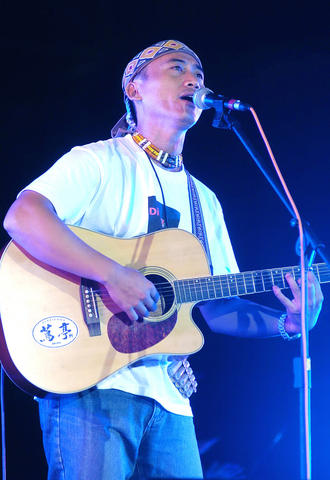On Monday, Sept. 24, reggae bands from Taiwan, Japan, Okinawa and the Philippines will gather on a Taitung County beach for what organizers say is the world's first international but exclusively Asian reggae concert.
The Love Concert (愛臺東音樂會) is part of three days of live music at the Taitung 2007 East Coast Music Festival (2007東海岸音樂季), which runs through Tuesday, Sept. 25 at the East Coast Jialulan (伽路蘭) Recreation Area, just south of Dulan (都蘭) off Highway 11 (台11線公路).
"I never have the chance to be somewhere where the Asian reggae scene is in one place at one time," said Patrick Chen, also known as Red-I, who helped book the festival's international bands and who will perform at the show with his band the Riddim Outlawz. "When I go to Japan, I'll be the only band from abroad that's Asian. This is the first time this has happened in Asia. Not just in Asia. This is the first time period."

PHOTO: TAIPEI TIMES
The festival started earlier this month with a series of music workshops and is the new incarnation of what was previously called the Dulan Mountain festival. It ends Sept. 25 with a nakashi revival featuring the Fa-Li band (法力樂團), and the Leo Shiao Cha Kaan band (留笑茶看樂團).
Sunday, Sept. 23 will feature many of Taiwan's best-known Aboriginal singers. Scheduled to perform are Puyuma musician Pur-dur, (陳建年), winner of a Golden Melody in 2000 for Best Male Performer and again this year for Best Instrumental Album Producer; Bunun singer Biung (王宏恩), who in 2002 won a Golden Melody for Best Non-Mandarin Male Singer and received five nominations for his Mandarin-language album in 2004; popular Puyuma pub duo Hao-en (昊恩) and Jiajia (家家), who won this year's Golden Melody for Best Singing Group; Atayal musician Tseng Shu-chin (曾淑勤); and 2005 Ho-Hai-Yan Battle of the Bands winners Totem (圖騰).
Phoebe Chen (陳怜燕), director of Taitung County Cultural Affairs Bureau, said the festival is a homecoming party for these musicians: "So many famous singers are from Taitung. The people here are born to make great music."
Red-I, who sees it as his mission to help popularize what he calls "island music" in Taiwan, has booked Japanese reggae legend Papa-U-Gee and the Stoned Rockers Band, Coco Tabo from Okinawa and Filipino act Papa Dom and the Tropical Depression Band for the Sept. 24 Love Concert. Red-I and the Riddim Outlawz will also perform, as will indie-rock group Relax One (輕鬆玩樂團) and Aboriginal musician Mama Panai (巴奈).
Chen said she expects crowds of around 2,000 people per night. There will be a market selling local musical instruments, music-related handicrafts and music, barbeques, and space for camping near the beach. To minimize the festival's impact on the environment, visitors must bring their own eating utensils and are encouraged to take a shuttle bus from Taitung Train Station instead of driving directly to the site.

May 11 to May 18 The original Taichung Railway Station was long thought to have been completely razed. Opening on May 15, 1905, the one-story wooden structure soon outgrew its purpose and was replaced in 1917 by a grandiose, Western-style station. During construction on the third-generation station in 2017, workers discovered the service pit for the original station’s locomotive depot. A year later, a small wooden building on site was determined by historians to be the first stationmaster’s office, built around 1908. With these findings, the Taichung Railway Station Cultural Park now boasts that it has

The latest Formosa poll released at the end of last month shows confidence in President William Lai (賴清德) plunged 8.1 percent, while satisfaction with the Lai administration fared worse with a drop of 8.5 percent. Those lacking confidence in Lai jumped by 6 percent and dissatisfaction in his administration spiked up 6.7 percent. Confidence in Lai is still strong at 48.6 percent, compared to 43 percent lacking confidence — but this is his worst result overall since he took office. For the first time, dissatisfaction with his administration surpassed satisfaction, 47.3 to 47.1 percent. Though statistically a tie, for most

Wooden houses wedged between concrete, crumbling brick facades with roofs gaping to the sky, and tiled art deco buildings down narrow alleyways: Taichung Central District’s (中區) aging architecture reveals both the allure and reality of the old downtown. From Indigenous settlement to capital under Qing Dynasty rule through to Japanese colonization, Taichung’s Central District holds a long and layered history. The bygone beauty of its streets once earned it the nickname “Little Kyoto.” Since the late eighties, however, the shifting of economic and government centers westward signaled a gradual decline in the area’s evolving fortunes. With the regeneration of the once

In February of this year the Taipei Times reported on the visit of Lienchiang County Commissioner Wang Chung-ming (王忠銘) of the Chinese Nationalist Party (KMT) and a delegation to a lantern festival in Fuzhou’s Mawei District in Fujian Province. “Today, Mawei and Matsu jointly marked the lantern festival,” Wang was quoted as saying, adding that both sides “being of one people,” is a cause for joy. Wang was passing around a common claim of officials of the People’s Republic of China (PRC) and the PRC’s allies and supporters in Taiwan — KMT and the Taiwan People’s Party — and elsewhere: Taiwan and